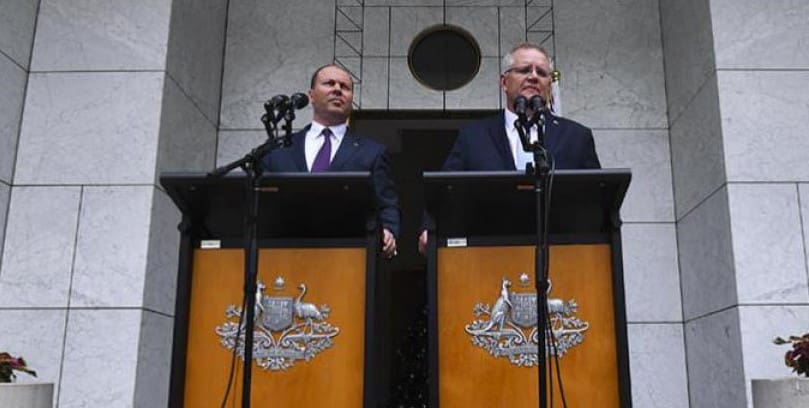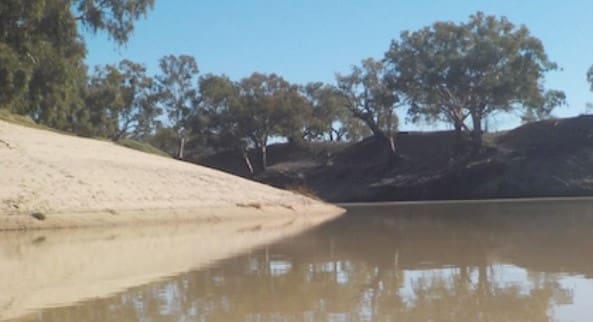At a glance: Incentives for agriculture in the Federal Budget:
- $2 billion for National Water Grid
- $1.5b for local manufacturing, including food manufacturing
- $553 million for supporting regional Australia
- $328m to support agricultural exporters
- $270m for the Murray-Darling basin
- $156m for drought support
- Major expansion of the instant asset write-off, introduction of carry back provisions
- Stage 2 of personal income tax cuts brought forward

THE Federal Budget brought down overnight by Treasurer, Josh Frydenberg, was one of the most stimulatory ever seen, according to National Australia Bank’s (NAB) agribusiness economist, Phin Ziebell.
Outlining the key elements impacting the agriculture sector, Mr Ziebell said these included:
Tax changes
A key feature of the 2020-21 budget a very substantial expansion of the instant asset write-off. Businesses with a turnover of less than $5 billion can now deduct the full cost of eligible capital assets until 30 June 2022.
This will apply to new depreciable assets and the cost of improvements to existing eligible assets. SMEs (with aggregated annual turnover of less than $50 million), can also fully expense second-hand assets. The total cost of this is $26.7b over the forward estimates.
Businesses with a turnover of less than $5b can also carry back tax losses from the 2019-20, 2020-21 or 2021-22 income years to offset previously taxed profits in 2018-19 or later income years.
Stage 2 of the Personal Income Tax Plan has been brought forward to 1 July 2020 from 1 July 2022.
National Water Grid
The budget sets out an additional $2b over 10 years (just over half of which is in the forward estimates) to fund priority water infrastructure projects for agriculture and to increase water security. This includes (alongside states) and additional $162.5m for the Wyangala Dam and $121.0m for the Dungowan Dam in NSW.
Support for agricultural exporters
The budget provides $328.4m over the forward estimates to help agricultural exporters do business. This includes $222.2m to modernise ICT systems and business processes, $71.1m for the financial sustainability of export certification services and $35.2m for “targeted interventions” and regulatory reforms.
Murray-Darling communities investment package
The budget provides $269.6m for the Murray-Darling basin, which includes:
 $37.6m to extend the Murray-Darling Basin Economic Development Program
$37.6m to extend the Murray-Darling Basin Economic Development Program- $37.6 for the environment in the SA Riverland
- $24.5m for community grants for river and wetland health
- $4.2m for Indigenous River Rangers
- $38.7 for compliance, including to set up the Inspector-General of Water Compliance
- $25m to improve metering systems, particularly in the northern basin
- $7.5m track and ecological, economic and social conditions
- $6m for improved information
- $70.5m to accelerate at-risk projects in the Basin Plan
- $18m for Basin Plan implementation
Drought support
The budget sets out $155.6m for drought support, including:
- $50m in 2020-21 for the On-farm Emergency Water Infrastructure Rebate Scheme
- $19.6m in 2021-22 to extend the drought function of the National Drought and North Queensland Flood Response and Recovery Agency for a further year
- $86m over four years to establish eight Drought Resilience and Adoption Hubs
Modern Manufacturing Strategy
The Modern Manufacturing Strategy sets out $1.5b over five years to improve competitiveness, scale and resilience in Australian manufacturing. The strategy will focus on six areas: resources technology and critical minerals processing, food and beverages; medical products, recycling and clean energy, defence and space. The strategy includes:
- $1.3b to establish the Modern Manufacturing Initiative
- $107.2m for supply chain vulnerabilities
- $52.8m for manufacturing modernisation
- $30m to improve competitiveness
- $20m to Industry Growth Centres
- Supporting regional Australia
While not an explicit support to agriculture, the budget does provide $552.9m over the forward estimates for support for regional Australia, including for community infrastructure, health, R&D, tourism, regional recovery and digitisation.
Other measures include:
- $36.6m for changes to the Environment Protection and Biodiversity Conservation Act 1999
- $2.4m to extend the Improved Access to Agricultural and Veterinary Chemicals program
Mixed report card from GrainGrowers
GrainGrowers said that while elements of the budget would achieve results for Australian grain growers, there was “room for improvement” in other areas that GrainGrowers raised in its pre-budget submission.
“The instant asset write-off uncapped for two years is a win for growers’ back pockets and a long standing ask of GrainGrowers,” chairman Brett Hosking said.
“Other good news includes continued funding for the ag vet chemicals program and workforce related announcements including the changes to Youth Allowance and ABSTUDY by demonstrating three months of farm work.
“However, with many growers looking forward to a bumper crop and the grains industry poised to lead the COVID recovery, some straightforward support measures called for by GrainGrowers and other industry voices have not been recognised in this budget.”
Mr Hosking said Australian grain growers would bear the brunt of devastating tariffs imposed by China on Australian barley, with an anticipated cost of $2.5 billion.
“The government has been called upon to invest $20 million to an industry recovery fund to accelerate market development and capture opportunities in Australia itself,” he said.
“We know that this is a budget delivered in unprecedented times. It’s a broad approach and there are positive outcomes for growers, like many other Australians.”
Mr Hosking said it was good to see the significant investment in infrastructure in the budget, however critical agricultural freight routes appeared to have been overlooked.
“What we are incredibly disappointed about is that the government has not seen fit to invest in the sector that is well placed to drive Australia’s economic recovery, particularly as the trade issues have been outside growers’ control. The Industry Recovery Fund is about ensuring export revenue comes back to Australia and this feels like a missed opportunity.”
NFF backs bold spending
National Farmers Federation (NFF) president, Fiona Simson, said Treasurer Frydenberg had outlined a pragmatic but bold spending agenda that would accelerate agriculture’s growth and regional Australia’s contribution to the nation’s bottom line.

Fiona Simson
“The NFF welcomes a combination of big-ticket, future-focused regional infrastructure spends and immediate cash injections needed to stimulate growth and to address the COVID-induced challenges facing farmers, including critical labour shortages.”
Ms Simson said the $1.5 billion Modern Manufacturing Package included an additional $50 million for Industry Growth Centres to progress manufacturing priorities for identified industries, including food and beverage.
“More than $100 million will be directed to tackling supply chain vulnerabilities and building future resilience,” she said.
Ms Simson applaud the $328 million “congestion busting” package for agricultural exporters.
“Making it easier for Australia’s export-dependent agriculture sector to export our sought-after products to the world, will be integral to agriculture achieving the growth needed for agriculture to tally $100 billion in farm gate output by 2030,” he said.
Infrastructure spend supported by NSW Farmers
NSW Farmers’ president James Jackson said the budget was overall positive news for the sector with key infrastructure spends that would help drive Australia out of its COVID-19 induced recession.
“The budget will help deliver certainty for farmers so they can be productive, profitable and sustainable after years of drought, simultaneously aiding Australia’s recovery from recession.
“The standout is probably the $10 billion in additional money for infrastructure, including $591 million for the Newell Highway.
“The budget also recognises the imminent labour challenges for upcoming harvests through covering $6,000 in relocation costs and amending Youth Allowance eligibility thresholds to attract workers to the regions just in time for harvest.
“Another win for farmers is the no-cap instant asset write off tax break guaranteed over the next two years. This will give farmers the certainty they need to invest back into their businesses while helping to stimulate local economies.
“There are numerous opportunities for local value adding in agriculture, which will strengthen regional economies and also help farming businesses diversify their operations,” Mr Jackson said.
However, NSW Farmers was disappointed to see a lack of investment in biosecurity.
FCA says missed opportunity
Farmers for Climate Action (FCA) said the budget was a missed opportunity.
CEO Wendy Cohen said the government could have simultaneously created good jobs in regional and rural communities while tackling climate change – but it instead chose to use taxpayers’ money to prop up the fossil fuel industry.
“A clean, renewables-led recovery could have put the Australian economy on a more solid and sustainable path to recovery, tackling the pandemic and the rising risks of climate change at the same time,” she said.
“The federal government has failed to meet the moment with this budget, with the smattering of climate-smart initiatives swamped by the billions in taxpayers’ subsidies for gas and other fossil fuels.
“It’s not as if they didn’t have good examples to follow. Earlier this year the EU seized the opportunity, investing more than $800 billion in everything from renewable energy to low-emissions agriculture and electric cars.
“Per capita, that’s almost nine times more than the Australian government proposes to invest in a climate-smart economy.”
Ms Cohen said FCA welcomed investment in resilience-building under the Future Drought Fund, as well as new Budget initiatives, such as cleaner energy in food manufacturing, rural mental health, incentives for microgrids in farming communities, and new efforts to build a recycling industry.
“All of these initiatives can help rural and regional communities adapt to climate change and prosper in a low-emissions world, but they do not deal with the drivers of climate change.
“In Australia and worldwide, 2020 has once again shattered records, how many more megafires will it take to wake our politicians up?
“More extreme weather is already costing Australian farmers money. This budget could have been used to help turn things around, but instead, the federal government has wasted another year.”
Irrigators welcome infrastructure boost
The National Irrigators’ Council (NIC) chief executive officer, Steve Whan, has welcomed the federal budget commitment to growing and processing food and fibre in Australia.
“Over recent weeks, the Government has announced initiatives that will help agriculture continue to lead in adopting renewables and reducing use. The federal budget’s extension of instant asset write-off will build on that, with potential for use for new energy efficient equipment including pumps and cooling systems, or on-site renewable generation,” he said.
“On water, the allocation of $2 billion toward new infrastructure through the National Water Grid is a massive boost. In some areas that will mean being able to sustainably increase water storage capacity and expand regional production and jobs, in others it could mean being more efficient water use, delivery and storage.
“We see a lot of unnecessary political argument about new dams, yet instead, we need to be looking at this as an opportunity to optimise infrastructure to expand production in areas where that is sustainable and look at how we can use water infrastructure to ameliorate unavoidable impacts of climate change for producers, communities and the environment.
“NIC also welcomes the funding provided in the budget to implement initiatives for Murray Darling Basin communities recently announced by the Water Minister, the Hon Keith Pitt.”
Sources: GrainGrowers, NAB, NFF, NSW Farmers, FCA, NIC

HAVE YOUR SAY